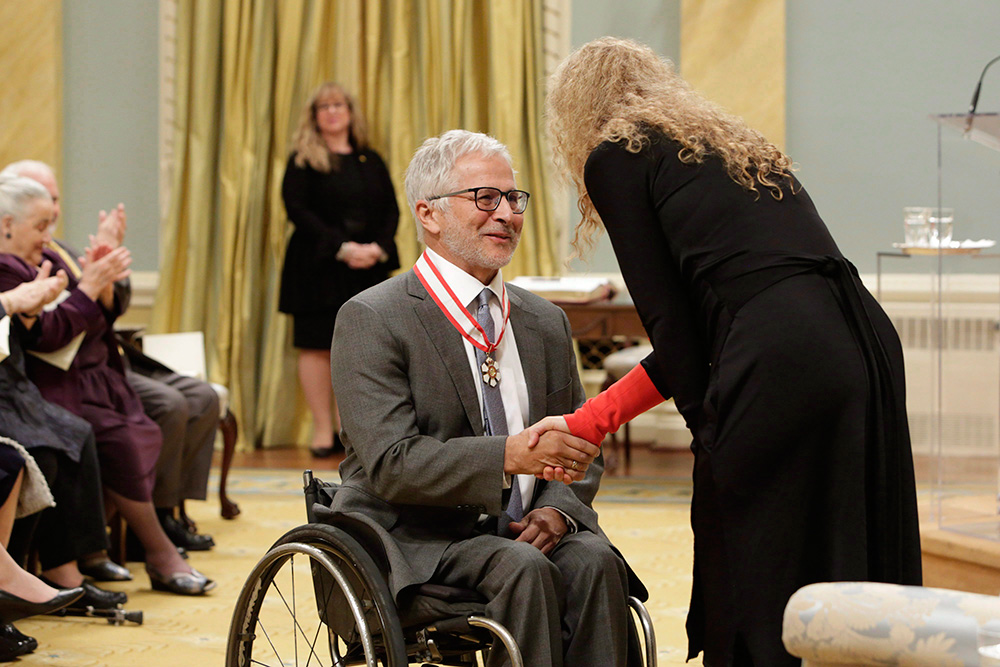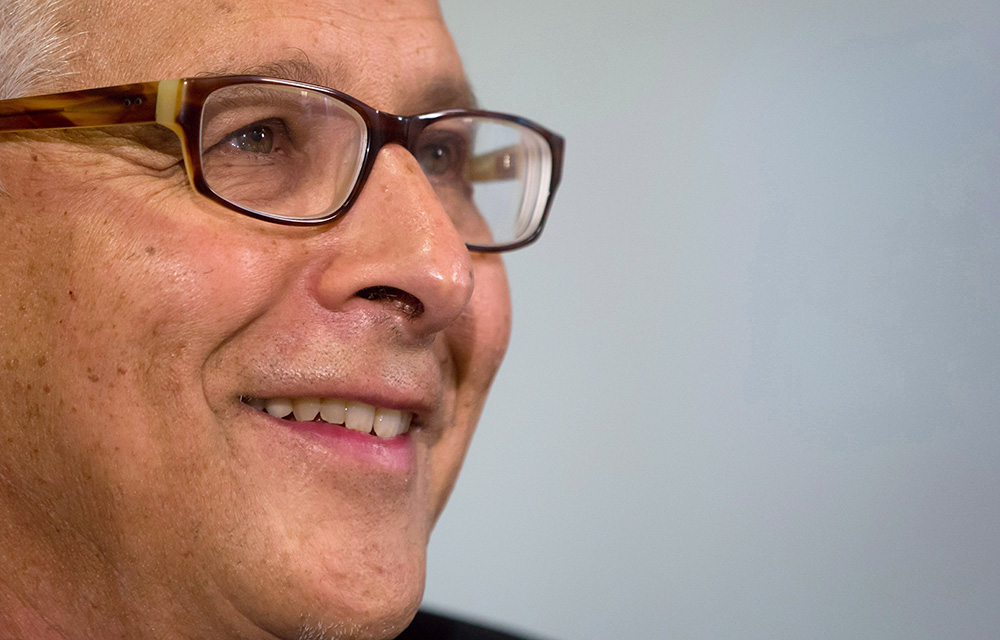Joe Arvay changed your life. That is true even if you have never heard of him.
The Victoria lawyer, who died suddenly of a heart attack Monday at 71, was perhaps Canada’s most successful constitutional litigator, bringing about sweeping social change through the force of his arguments. He had a remarkable talent in getting judges to appreciate, both viscerally and intellectually, the ill-treatment suffered by the clients he represented.
Six years ago, Arvay appeared before the Supreme Court of Canada to make the case for deathly-ill people having the right to choose a time and means of death.
Arvay told the court a prohibition against assisted suicide created a black market in overseas drugs, as desperate, dying people relied on illicit and dangerous means to end their suffering, not always successfully.
He addressed the vociferous opposition raised by religious organizations and groups representing people with disabilities, who feared a change in the law threatened vulnerable populations.
“I would be the very last person,” he told the justices from his wheelchair, “to ever suggest that one is ‘better off dead’ than being disabled.”
Arvay was representing the BC Civil Liberties Association in the case, known as Carter v. Canada. Lee Carter and husband Hollis Johnson, of Roberts Creek, B.C., had travelled to Switzerland with her mother, Kay Carter, an 89-year-old with degenerative spinal stenosis, who then ended her life at a clinic with medical assistance.
While attempting suicide was not a crime, aiding in a suicide was a criminal offence in Canada carrying a possible 14-year jail sentence. The couple, along with others, challenged the law as unconstitutional. The court agreed with the family, ruling the laws prohibiting assisted suicide “unjustifiably infringe” on Section 7 of the Charter of Rights and Freedoms, which guarantees “life, liberty and security,” effectively allowing physician-assisted suicide. Procedural safeguards were later established under the federal Medical Assistance in Dying Act.
For most lawyers, helping to create the right to a dignified death would have been a career capper. For Arvay, it was but one of many that changed our daily lives.
He did not always win, but he won a lot, and he won sometimes when opposing counsel went into a case thinking he did not have a chance. He was a “freedoms fighter,” as a magazine described him in a memorable headline.
Two events — one political, the other personal — set Arvay on his path.
A car accident at 19 made him a wheelchair-using paraplegic whose access to buildings — even sidewalks — was limited by discrimination and negligence. In an instant, the permanent damage done to his spine forced him to confront a social and legal system that considered him unworthy of a full place in society.
“I went from being a member of the majority and all of a sudden became a member of a minority,” he told Emma Crawford Hampel of Business in Vancouver six years ago. “I became acutely aware of discrimination and prejudice against minority groups, including me.”
In 1982 Canada adopted a new Constitution including the Charter of Rights and Freedoms, a broad rulebook whose limits and possibilities Arvay, an expert in constitutional law, intended to test and define. After several years of representing the British Columbia government in charter cases, he left for private practice. If he had to choose between representing the government or the governed, he preferred to be on the side of his fellow citizens.
For nearly four decades, he poked, prodded and challenged the possibilities of the charter, remaking the politics and the social norms of a modern nation. At least one case has already become the subject of a Heritage Minute.
Jim Egan and Jack Nesbit had lived together for decades in a loving relationship. When the younger Nesbit reached age 60, he applied for spousal benefits under the Old Age Security Act — only to be denied. The couple met every standard except for being the same sex.
They appealed, and the case ultimately went to the Supreme Court. The justices split 5-4, the majority denying the spousal benefit even while acknowledging such discrimination was contrary to the charter, opening the door to subsequent gay and lesbian rights cases. Egan and Nesbit lost the battle, but gays and lesbians won the war for equality, including the right to same-sex marriage.
A brief list of Arvay’s success using the charter to gain important rights for the poor and the oppressed include landmark cases ending indefinite solitary confinement in federal prisons, establishing a community group’s right to operate the Insite supervised-injection facility, the striking down of prostitution law, defending Little Sister’s Book and Art Emporium against Canada Customs agents' punitive targeting of the bookstore’s imported shipments, and overturning a Surrey School board ban on primary-school books depicting same-sex couples.
His efforts enshrined collective bargaining as a right under the charter while striking down parts of the BC Liberal government’s anti-union agenda, which included tearing up collective agreements and privatizing 8,000 hospital jobs, many held by women.
And on and on and on.
He appeared before the Supreme Court of Canada more than six dozen times.

Tellingly, when B.C.’s provincial judges were in a compensation dispute with the provincial government, they hired Arvay.
At one point, he was investigating then-NDP premier Mike Harcourt after conflict-of-interest allegations, while simultaneously defending a former NDP cabinet minister against charges of sexual harassment. Soon after he added a lawsuit by B.C.’s charity bingo parlours against the provincial government.
While he took many of the charter cases on a pro bono or pay-what-you-can-as-you-can basis — representing Little Sister’s that way for 17 years — Arvay also handled medical malpractice cases. He represented polygamous sect leader Winston Blackmore on criminal charges of polygamy and the Hells Angels when they challenged civil forfeitures.
A dynamic figure in the courtroom, where his voice on occasion betrayed a hint of the passion with which he tackled cases, Arvay was surprisingly soft-spoken and accessible away from the august setting of the courts. He had the measured ego of a man who knew precisely his achievements. He was in no need of gratuitous praise.
Arvay was known for bombing around Victoria streets on a motorcycle equipped with a sidecar. When his daughter, Emily Rose, was little, she perched in his lap as he wheeled along city sidewalks. He owned a 1937 wooden sailboat on which he puttered around the Gulf Islands and into Desolation Sound. On Whistler Mountain, he was an early user of a sit-ski to race down the slope. A weekly viewing of 60 Minutes was a Sunday sacrament, after which he would call his father to discuss the show.
Joseph James Mark Arvay was born on March 18, 1949, in Welland, Ont., a fraternal twin to sister Maryjane, the pair a second and third child for the former Laura Teresa Monaco and James Arvay, a businessman who owned a stationery store and printer. The father’s ancestry was Hungarian, the mother’s Italian.
As a boy, Joey enjoyed watching Raymond Burr portray the lawyer Perry Mason on the popular eponymous television crime drama, which he watched with his parents on WBEN, the CBS affiliate in nearby Buffalo, N.Y.
His father, who served for 25 years as one of Welland’s three hydro commissioners, used to tell his son about having organized a picket of students in Grade 3 to protest a lack of milk. Whatever lesson the boy took from his father’s story, his own future activism would be more argumentative than demonstrative.
In 1968, Arvay enrolled at Huron University College, an affiliate of the University of Western Ontario (now Western University) in London, Ont., a bucolic campus where stone buildings are covered in ivy and where his older sister, Jeanne, graduated in 1967 with a degree in secretarial science. Arvay was uncertain about his own future path.
On a foggy journey in January 1969, an ugly month in which fog, ice and snow led to several horrific highway accidents in southwestern Ontario, Arvay suffered a devastating spinal injury when the car in which he was a passenger was involved in a highway collision. He was treated at Toronto General before moving to Lyndhurst Lodge for rehabilitation.
“Joe was told that he would spend the rest of his life in a wheelchair,” his twin sister said, “but with determination and sheer willpower he learned how to walk with braces and crutches.”
Defying both his injury and any lingering fear of highway travel, he celebrated his survival by soon after driving a 1971 Ford Pinto to the Mexican resort town of Acapulco, where he played piano in a bar to earn money for tuition. He graduated with an economics degree, then entered law school. (Incidentally, the page in the 1974 Occidentalia yearbook introducing Arvay and the other law graduates was illustrated by a full-page photograph of a wild marijuana patch.) He had found his calling, seeing in the law a practical avenue towards social justice, as he later recounted to the alumni magazine.
“Once I got to law school I thought, ‘This is like being a plumber with words. I can actually fix something.’”
He pursued graduate studies at prestigious Harvard Law, where he contemplated (but eventually rejected) writing a thesis on the future application of law on Mars. While at Harvard, he was recruited to teach at the University of Windsor.
He became an outspoken advocate for the rights of the disabled, telling a public hearing in Windsor that nine of 11 public buildings in Essex County were inaccessible, including city hall, the jobs centre and the main police station, as well as 11 of 13 post offices. While many restaurants were accessible, he told the meeting, their washrooms were not.
“There was no need for me to get to the back of the bus,” he once said, “if I was in a wheelchair and couldn’t even get on the bus.”
In 1979, then-Ontario premier Bill Davis named Arvay to a three-year term on the Ontario Advisory Council on the Physically Handicapped.
(Arvay also made the news after an RCMP constable died when his private car, a 1974 Ford Pinto, burst into flames after being struck from behind. Arvay, then an assistant law professor, wrote the federal transport department and local MP Herb Gray to report his 1971 Pinto, which had likely been built at a plant in St. Thomas, Ont., about 30 kilometres south of the campus, had also burst into flames the previous year. Arvay’s Pinto had been parked at the curb when a moving vehicle hit it from behind. “Had I been in the car there would have been no way in the world I would be talking to you now,” he told a reporter from the Windsor Star. “It was just a shell. There weren’t even any tires left.” The Pinto’s faulty gas-tank design caused many deaths, resulting in several prominent lawsuits in the United States alleging product liability and personal injury.)
While he enjoyed teaching and continued to lecture throughout his career, inspiring generations of law students, Arvay chafed at not being in the courtroom. He took a two-year leave of absence to follow boyhood hero Perry Mason by practising criminal law. Arvay would later acknowledge his obsession in pursuing picayune points of law did not always benefit the firm’s bottom line.
“I would get excited and spend hundreds of hours on an arcane point of law on a small case,” Arvay told the alumni magazine in 2003. “This might interest an academic, but my boss felt it was ridiculous to spend so much time working up a legal point.”
A posting in a law journal for a lawyer with expertise in constitutional law caught his eye. “It was a real impulse decision,” he told the Windsor Star. “It just came up and I decided to go for it.” He left Ontario in 1981 and moved to Victoria to work in British Columbia’s ministry of the attorney general just a few months before the charter was enacted. He represented the province before the Supreme Court of Canada in the landmark Delgamuukw case, the first major land claim in Canada.
Arvay was appointed Queen’s Counsel in 1987 at 38, an exceptionally young age for the honour. In 2000, the Canadian Bar Association presented him the inaugural Walter S. Tarnopolsky Human Rights Award. Five years later, he received the Reg Robson Liberty Award from the BC Civil Liberties Association.
He received honorary degrees from Osgoode Hall Law School and the University of Victoria. In 2017, he was named an officer of the Order of Canada and was awarded the Order of B.C. the following year. Undoubtedly, many further honours were to come.
Arvay leaves Connie Addario, his wife of 20 years; five children from their blended families, including Emily from his first marriage to Marla Buchanan; six grandchildren; and two sisters, Jeanne Pender and Maryjane Cruise.
The late Jim Deva of Little Sister’s liked to tell a story about Arvay’s dedication. Officials had seized what they deemed pornography from a bookstore shipment. Deva told the lawyer the material could not possibly have been prohibited since it was readily available at other stores, an indication Little Sister’s was being persecuted.
To make his client’s case, Arvay trolled the tawdry offerings of a Granville Street smut shop an hour before a scheduled court appearance, yet again seeking justice in a most unlikely setting. ![]()
Read more: Rights + Justice, Politics
















Tyee Commenting Guidelines
Comments that violate guidelines risk being deleted, and violations may result in a temporary or permanent user ban. Maintain the spirit of good conversation to stay in the discussion.
*Please note The Tyee is not a forum for spreading misinformation about COVID-19, denying its existence or minimizing its risk to public health.
Do:
Do not: